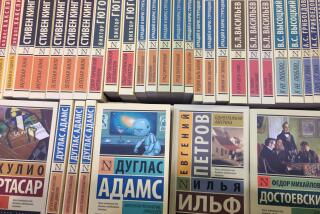THE GOOD COLD DAYS : The World Was a Simpler Place When Foreign Policy Was Only a Matter of Us Versus Them
- Share via
This is a time for light summer reading. So I’ll try to make this as light and summery as possible.
Hey, dude, guess what the next wave’s bringin’ in? In about five years, we’re going to look back at the Cold War as a golden age of international affairs.
Of course, with the memory of the ecstatic waltzing Hungarians in the GE commercials still fresh in our memories, it’s hard to see the battle between the Free World and the Communist version as anything other than, as John F. Kennedy called it, a long twilight struggle, with the game finally called on account of darkness. But take note. You read it right here, between the table of contents and the rattan-store ad: The Cold War’s going to look real good, real soon.
Just look at the early warning signs from an Eastern Europe so recently euphoric: Yugoslavia, a long-inert compound, is beginning to dissolve into its component elements; Poland and Romania are hosting revivals of anti-Semitism like a desperate producer mounting one more production of “The Drunkard” for the hard-to-please; and the West Germans are harboring dark thoughts about the escalating cost of letting the Easterners into their Good Thing.
These are the tender shoots of a bumper crop to come: the ethnic strife, religious animosity and border squabbles that were suppressed, at least in Europe, by a half-century’s worth of penny-ante empire, Soviet-style. As this stuff returns to its historical robustness, we will realize to our dismay that the Cold War--grim as it seemed at the time, with its gulags and blacklists and Emergency Broadcast System tests--was a novel dose of neatness in a very messy world.
There’s nothing wrong with a messy world--unless you are peddling something called the New World Order. Then, like a parent with a teen-ager, you may be forced to view messiness as a personal affront. This may be why our country is mucking about in matters such as how many Amharans the new Ethiopian government should contain. It may be why we are trying so hard to convince the Croats and the Kurds that nationhood is not all it’s cracked up to be. It may be why, oil aside, we rose so firmly to the defense of Kuwait, the nation with the let-the-foreigners-do-it work ethic.
The keystone of our foreign policy used to be anti-Communism. “Us against Them!” was all the inspiration most of us needed. For a brief moment, we considered making the support of democracy our goal, but we’re going to do that right after we clean up the wholesale liquor business. No, the common thread in our most recent weavings has been distinctly less inspiring. We stand for stability. We rang a bell, and those people who didn’t get their independence, or their ancient territory, or whatever else they crave, by the time we said time’s up will just have to make do.
The lines drawn on maps by the British and French earlier in this century, as they divided up the spoils of war and wound down their empires, have become the lines we’ll draw in the sand, or other appropriate soil types. The New World Order is not “Hamburgers for Everyone!” It does mean that the United States, and whoever else we can rope into this project, has become the Map Police.
Back when we thought we detected the Communist hand behind every outbreak of turmoil, at least a mildly respectable argument could be advanced that our national interest lay in global stability. It’s a lot harder to figure why we should now stand athwart the forces of change wherever they choose to erupt. Especially since the New World Disorder is clearly not controlled, or even influenced, by Moscow. In the bad old days, when every civil war and border skirmish was ennobled with the mantle of the East-West struggle, Washington needed to call only one phone number--the Kremlin’s--to try to keep the lid on. Today we need the numbers of people only a few obscure State Department desk officers even know the names of.
Citizens all over are messing with those arbitrary lines on the globe. We call this tribal conflict in Africa; we elevate its status to ethnic strife everywhere else. In such a world, being the Map Police may be more frustrating than being a New York subway cop. The simplicity of the Cold War is going to seem mighty appealing. Back then, Herbert Philbrick wrote a best-seller about his adventures as an FBI man posing as a Communist, “I Led Three Lives.” Herb would need to lead about a hundred lives now.
More to Read
Sign up for our Book Club newsletter
Get the latest news, events and more from the Los Angeles Times Book Club, and help us get L.A. reading and talking.
You may occasionally receive promotional content from the Los Angeles Times.










